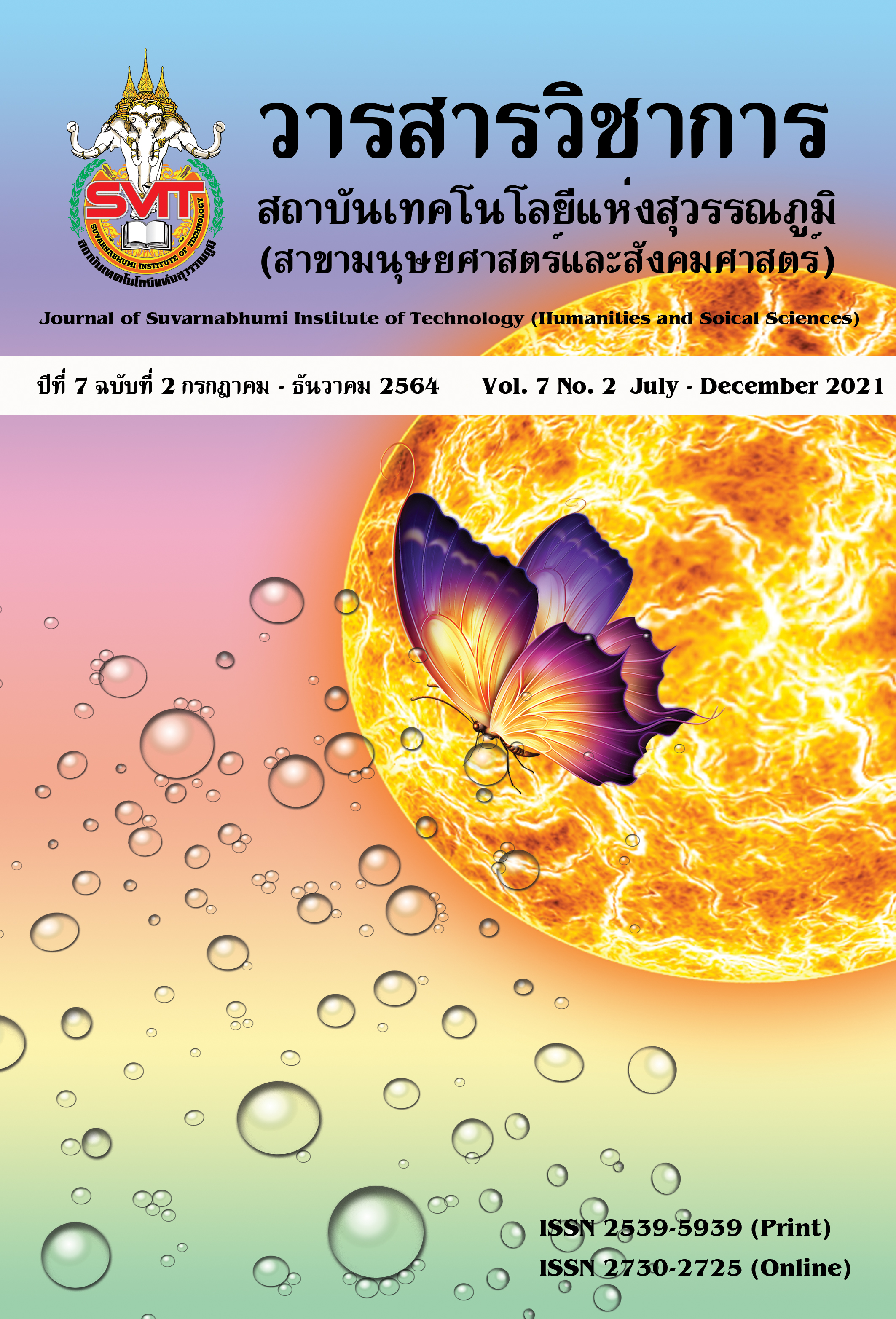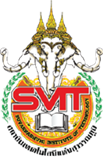THE CAREER DEVELOPMENT APPROACH: ENABLING THE MARINE DEPARTMENT PIER STAFF IN BANGKOK TO DEVELOP ENGLISH COMMUNICATION SKILLS
คำสำคัญ:
career development, English communication skill of Marine department pier staff in Bangkok, Improve English in communicationบทคัดย่อ
The objectives of this research and development study were to 1) Study the communication related problems of pier staff who serve foreign tourists using public passenger boats in Bangkok, 2) develop tools to improve the English communication skills of the pier staff, 3) evaluate the developed processes and tools for developing the staffs’ English communication skill, 4) propose guideline on career development to the pier staff. The researcher employed mixed methods research. The research and development consisted of 5 stages: Analysis stage, Design stage, Development stage, Implementation stage, and Evaluation stage. The analysis stage employed a qualitative research method to analyze the communication related problem of the pier staff when they provide service to the foreigners. Qualitative research was also used for developing tools for improving the English communication skill of the pier staff as well as proposing a guideline for developing the career development for the pier staff. A quantitative research method was used for evaluating the developed process and tools for developing the pier staff communication skill.
The sample used to study the problem was 46 staff, the population for the implementation of the developed tools was 60 pier staff. The participants who provided information for the qualitative research part were 8 foreigners who used the pier service in the past. The tools used for the quantitative data collection were questionnaires and an English skill test. The statistics used to analyze the quantitative data generated percentage, mean and standard deviations. The tool for collecting qualitative data was an In-depth interview. The qualitative data analysis was conducted by summarizing important points.
The results of this research were that: 1) 70.50% of the pier staff needed to develop their English communication skills, 67.40% thought the use of a mini-book would help. 2) The process of improving English language skills through self-learning with a mini book and e-learning classes was also appealing. 3) The result after using the developed tools increased English skills by 60.10%. 4) Career development guidelines were: To organize English and Chinese language training courses every 6 months.
เอกสารอ้างอิง
Bartram, M., & Walton, R. (1991). Correction: A positive approach to language mistakes. Hove: Language Teaching.
Bunpa. K. (2011). The Study of Fundamental Human Resources Effecting Participatory Ecotourism Management: a case study of Wat Khao community, Kokkloi subdistrict, Takuatung district, Phang-nga province (Ressearch report). Phang-nga: Rajapruk Univer-sity
Cavus, N., Uzunboylu, H., & Ibrahim, D. (2006). The effectiveness of using learning management systems and Collaborative tools in web-based teaching of programming language. Paper presented at the 3rd International Symposium and Education on Electrical, Electronic, and Computer Engineering (ISEECE 2006), 23-25 November, 2006, Near East University, Lefkoşa, Cyprus. Retrieved from https://files.eric.ed.gov/ fulltext/ED503541.pdf
Creswell, J. W. (2007). Qualitative inquiry and research design: Choosing among five approaches (2nd ed.). Thousand Oaks, CA: Sage.
Creswell, J. W. (2009). Research design: Qualitative, quantitative, and mixed methods approaches (3rd ed.). Thousand Oaks, CA: Sage.
Creswell, J. W., & Miller, D. L. (2000). Determining validity in qualitative inquiry. Theory into Practice, 39(3), 124-130.
Guba, E. G. (1990). The paradigm dialog. Newbury Park, CA: Sage.
Heathfield, S. M. (2018). The balance careers: What is human resource development (HRD)? Retrieved December 23, 2021, from https://www.thebalancecareers.com/what-is-human-resource-development-hrd-1918142
Hirunthet, W. (2011). Satisfaction of foreign tourists with the service of tourists police in Khao San Road, Bangkok. Bangkok: Ratchaphruek College.
Kanlaya, P. (2007). The use and the problems of English and intercultural communication Skill of Thai tourist police office. Bangkok: University of the Thai Chamber of Commerce.
Karimova, V. (2016). The English language for global communication: Perspective of youth. Retrieved December 23, 2021, from https://www.researchgate.net/publication/3110 68862_The_English_Language_for_Global_Communication_Perspective_of_Youth
Lourdunathan, J., & Menon, S. (2005). Developing speaking skills through interaction strategy training. The English Teacher, 34, 1-18.
Lynham, S. A. (2000). Organization development for performance system. St. Paul: University of Minnessota Human Resource Development Research Center.
Marine Department. (2018). Vision & mission. Retrieved December 23, 2021, from http://www.md.go.th/en/index.php/2014-02-21-05-45-11
MCLagan, P. A. (1989). The models: A volume in models for HRD Practice. Alexandria, VA: Ammerican Society for Training and Development,
Meemak, M. (2002). An analysis of needs and problems of English for tourist police. Nakhonpathom: Institute of Language and Culture for Rural Development, Mahidol University.
Patton, M. Q. (2002). Qualitative evaluation and research methods (3rd ed.). Thousand Oaks, CA: Sage.
Pisitpaiboon, S. (2016). The health promotion foundation, the sustainabillty os well-being for Thai people. Bangkok: The Ministry of Public Heath.
Reuters and Bangkok Post. (2017). Thailand has ‘world’s most congested traffic’. Retrieved December 23, 2021, from http://www.bangkokpost.com/news/general/1201869/ Thailand
Rubin, H. J., & Rubin, I. S. (2005). Qualitative interviewing: The art of hearing data (2nd ed.). Thousand Oaks, CA: Sage.
Srichitra.N. (2014). An analysis of needs, problems, abilities, and forms in using English oral communication of hotel front office staff in Muang district, Loei province. Journal of Research and Development Loei Rajabhat University, 9(28), 93-105.
Swanson, R. A., & Holton III, E. F. (2005). Research in organizations foundations and methods of inquiry. San Francisco, CA: Berrett-Koehler.
Taraporn, T., Torat, S., & Torat, B. (2014). The development of hotel English training program focusing on task-based instruction to enhance communication skills. Veridian E-Journal, 7(5), 205-221.
Thairath. (2016). Unlock code “Thailand 4.0” Create a new economy, Transcend the middle-income trap. Retrieved December 23, 2021, from https://www.thairath.co. th/content/ 613903
Yusics, U. (2015). Teacher creativity creating English speaking environment at Islamic senior high school Darul Hikmah Tawangsari Kedungwaru Tulungagung (Masters’ thesis). Faculty of Tarbiyah and Teacher Training, State Islamic Institute of Tulungagung.
Zyad, A. (2016). Critical success factors (CSFs) for information technology governance (ITG). International Journal of Information Management, 36(6), 907-916
ดาวน์โหลด
เผยแพร่แล้ว
ฉบับ
ประเภทบทความ
สัญญาอนุญาต
บทความที่ได้รับการตีพิมพ์เป็นลิขสิทธิ์ของวารสาร Sarasas Journal of Humanities and Social Science ข้อความที่ปรากฏในบทความแต่ละเรื่องในวารสารวิชาการเล่มนี้เป็นความคิดเห็นส่วนตัวของผู้เขียนแต่ละท่านไม่เกี่ยวข้องกับสถาบันสารสาสน์เทคโนโลยีแห่งสุวรรณภูมิแต่อย่างใด ความรับผิดชอบองค์ประกอบทั้งหมดของบทความแต่ละเรื่องเป็นของผู้เขียนแต่ละท่าน หากมีความผิดพลาดใดๆ ผู้เขียนแต่ละท่านจะรับผิดชอบบทความของตนเองแต่ผู้เดียว




